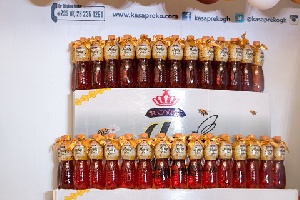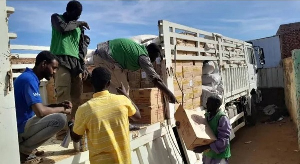Last week witnessed a major paradigm shift in Ghana’s local honey industry as the demand for the commodity has now move into a commercial drive.
Over the years, our local honey has received little attention from government, policy makers and investors despite its enormous economic and health benefits.
The local honey and bee farmers have been crying out loud and appealing to government and investors for the needed support as the commodity has huge potential to turnaround the economic fortunes of our local economy.
The Ghana Beekeepers Association (GBA), an association of farmers that harvest local honey in large quantities has prepared and submitted to the government a proposal worth GHc1.9 billion in order to make the business of honey production more viable and lucrative.
On May 19, 2017, the association in partnership with Ghanaian-owned total beverage producer Kasapreko unveiled Ghana’s first honey-based soft drink, Royal Honey Bee unto the market.
The initiative is seen by industry players as a big boost for local honey as Kasapreko will solely source the honey locally from the association to produce the drink. “The new drink is part of moves to promote the honey and also create employment opportunities in the industry.
We are currently producing six tonnes of honey annually and with the production of Royal Honey Bee, production levels of our honey will shoot up largely,” President of the Ghana Beekeepers Association, Patrick Addo-Newman told the media at the launch of the product.
Kasapreko is pumping about $7 million into the project and its lines of soft drinks as the company will solely depend on locally-produced honey from the farmers.
“We have decided to tap into the business of honey bee. After discussions and deliberations, we have partnered with the Ghana Beekeepers Association to produce Ghana’s first honey drink called “Royal Honey Bee”, a carbonated soft drink that is the industry’s first soft drink,” Managing Director of Kasapreko Richard Adjei said the unveiling event at the company’s head office.
“We are investing an amount of $7 million into this project and we have acquired new equipment for this because we believe this has a huge potential to uplift the honey bee industry in this country,” Mr Adjei added.
The Kasapreko boss was of the view that this project will help revamp the ailing bee and honey industry and also create more economic jobs in the country. “We at Kasapreko believe that the Ghanaian economy should be built and run by indigenes in order to create more jobs and empower better livelihoods.”
Mr. Addo-Newman commended Kasapreko for supporting the local honey industry and indicated that the association is ready to meet the production demand. According to him, the association will be engaging about 2,000 persons at each of their district offices to produce more honey for the project.
Click to view details



Business News of Friday, 26 May 2017
Source: www.ghanaweb.com

















